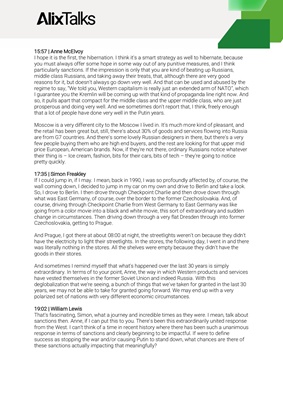
in the last six weeks as a result of the new designations. Plus, where do you go for that
information? Well, you go to corporate registries, who owns who.
Well, of course, what has Putin done? He's made it a treasonable offense to share that
information of corporate registries outside of Russia, and so therefore punishable by hard
labor. There is a real challenge in trying to understand how you affect these sanctions. It's not
just the name on the tin, it's actually what sits below that. And so that's very complicated. And
of course, all of the sanctioned entities themselves are looking to conceal who they own, the
relationship they have. And so, there's not only sanction circumvention from the entities
themselves, but also different jurisdictions may have a call about whether or not they want to
hold onto the business and therefore conceal the true ownership that sits below that.
So, it comes back to my mind about effectiveness. How do you make sure that when these
announcements are made, they actually get the desired effect? And that is not a trivial
undertaking.
16:00 | William Lewis
No. Ok, well, we'll pick that a bit later on. And a reminder to everyone on this call that please do
send in any questions using the chat function, and I'll look to weave them into our
conversation. So, thank you for that ahead of time.
Guy, can I just come to you on the point that Tom made earlier about coordination? Can we
just dig into that slightly? Because certainly there's been, the West has united in condemning
the invasion of Ukraine. But how in actual reality, how united are Europe and the U.S., actually,
when it comes to applying the sanctions, have we seen some divergence? Can you tell us a bit
about that? And also, we've obviously also seen hundreds of U.S. companies announce they're
pulling out of Russia, but it's not the same, for example, in France, where lots of companies
have decided to stay.
16:55 | Guy Harrison
Yeah. So, addressing those points in turn, I think at a headline level, there has been,
unprecedented is the word, coordination across the different regimes. But I think when you
actually get to the practical implication of that, there is more coordination required. And
clearly my stats are out of date because things are changing on an hourly basis at the
moment. But if you're looking at the U.S., EU, and U.K., the U.K. sanctioned about 1000
individuals, the U.S. about 900, and the EU about 800. So, all in all, let's say 1000. Of that
population, only 300 individuals are sanctioned by all three regimes. And the reason that
matters is because in terms of circumventing the sanctions, unless there is that level of
coordination and they're uniformly sanctioned, it's very difficult to enforce and easier for these
people to get around the sanctions themselves.
I think the other point to make there is that we're only really talking about the EU, the U.K. and
the U.S. There are plenty of other jurisdictions around the world who haven't taken any steps
to withdraw from Russia or enforce sanctions of their own. And I think if you look at the
movement of capital and physical assets, there's been a certain degree of sort of virtual
assets moving towards the Caribbean, tax havens such as British Virgin Islands, and physical
assets moving either back to Russia or to countries such as Turkey, or the UAE. And definitely
those safe havens are narrowing. There are fewer of them, and transparency is improving, but
while they exist, there is always a safety valve for these sanctions.